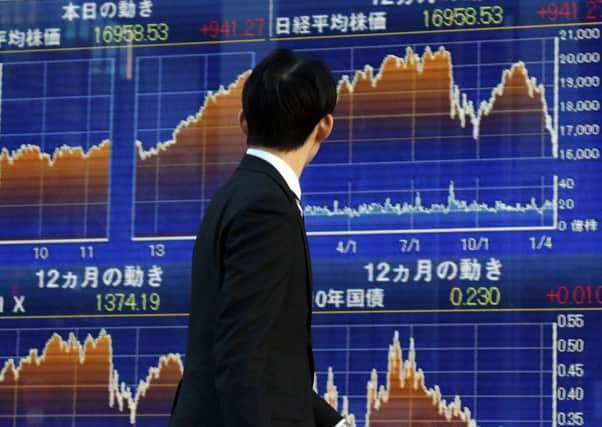Will bear market devour your money?


The FTSE 100 hit its lowest level in more than three years last week after further oil price falls and concerns over the global economy triggered a share sell-off. The UK’s blue chip index and other world markets recovered some losses at the end of the week, when the European Central Bank raised the prospect of further monetary stimulus.
But with the FTSE technically entering “bear market” territory on Wednesday and markets struggling since the start of the new year, investor confidence has suffered.
Advertisement
Hide AdAdvertisement
Hide AdSo where do we go from here? Should investors take action in response to the latest turbulence? Where might your money be safer?
We asked some of Scotland’s top investment experts for their views.
Is this a blip, or the start of the next crisis? Should I be worried?
Much depends on the timescale, according to William Forsyth, investment manager and principal at Charlotte Square Investment Managers. “The real issue is one of confidence – can China effectively shrink its borrowings without disturbing the global economy? This at a time when economic growth is anaemic elsewhere.”
David Thomson, chief investment officer at VWM Wealth in Glasgow, is optimistic for the medium term. However, he remains unsure as to whether the current situation is merely a mid-cycle economic slowdown or the start of a recession.
“There are currently mixed signals and we err a little more on the side of caution until a clearer picture emerges,” he said. “However, we do not yet want to move too defensively for fear of missing out on a potential rally if this proves to be a mid-cycle slowdown.”
Alan Steel, chairman of Alan Steel Asset Management, believes the sell-off has gone too far. “A wide array of indicators show today’s economic circumstances are totally different from 2008/09,” he said. “Equity Income funds and Cautious funds are hardly down at all. On balance we think this is an emotional overreaction.”
Iain Wishart, owner of Edinburgh-based Wishart Wealth Management, also urged perspective. “It’s essential that investors do not confuse the usual share price volatility for ‘loss’ – which more often occurs when investors panic. Volatility and ‘risk’ are not one and the same thing.”
What can I do (or not do)?
Advertisement
Hide AdAdvertisement
Hide AdThe key is to diversify – minimise risk by spreading your investment and pension holdings across different asset classes.
“You may not get the highs when stock markets are in a bull phase, but it dampens the lows,” said Derek Stewart, managing partner at Sam Wealth in Glasgow. “When the FTSE 100 broke the 7,000 barrier some clients were demanding higher returns than diversified portfolios provided, but when markets fall they realise why they aren’t only invested in equities.”
If you’re already well diversified the best advice is to be patient, believes Wishart.
“If your portfolio is diversified and already being regularly rebalanced then doing nothing might be your best option,” he said.
It’s still a good time to check your investments are right for you, said Forsyth: “Be very clear that your current asset allocation matches your risk profile and maintain a balance that lets you ride out sharp short-term fluctuations.”
It may also represent an opportunity, he added: “With the market drop the FTSE All Share Index now yields 4 per cent and while the resource stocks are clearly vulnerable, the trend has been for compound dividend growth over the years,” said Forsyth.
Are there any safe havens?
Fixed interest (such as bonds) doesn’t currently offer the shelter that it might have previously, Thomson warned.
“It’s vulnerable to setbacks unless the worst fears about economic growth are realised,” he said.
Advertisement
Hide AdAdvertisement
Hide AdForsyth said care has to be taken even with assets that may seem lower risk. “Large sums have been flowing out of bond funds partly on concerns that liquidity has become thinner,” he explained. “Most bond funds are open-ended and that can leave them vulnerable to mass redemptions.”
Commercial property may be a better option, said Forsyth, noting that while capital growth might be sluggish there are “fairly solid yields” available from property investment trusts.
Thomson and Forsyth both mention absolute return funds as a way to weather the current market conditions. But ultimately it comes down to diversification. “It’s best to have a spread of assets and keep an eye on developments with a view to tilting the portfolio to equities or more defensive assets in response to new data,” said Thomson.
How do market downturns affect me if I’m in drawdown?
Market falls can be particularly damaging for people in pension drawdown arrangements, which have grown rapidly in popularity under the so-called pension “freedoms’. That’s because of pound-cost ravaging, which is where the same level of income is taken from an investment even as its value declines, compounding the rate at which the fund loses value.
“If your drawdown is well diversified and you are not pushing the upper limit of withdrawals the longer term impact should be modest,” said Thomson.
But it’s difficult for drawdown portfolios to recover if they get off to a bad start, particularly when the withdrawals are being maximised, he warned.
“If you have scope to, it would be prudent to reduce your drawdown and/or take a break from drawdown for a period.”
One way to avoid pound-cost ravaging is to keep money in cash and short-dated bonds to cover income payments over one or two years, said Wishart.
Advertisement
Hide AdAdvertisement
Hide Ad“This allows the more volatile assets some time to recover. After all, there seems little sense in selling off shares in the great companies of the world whose values are temporarily down, just to meet short-term income needs.”